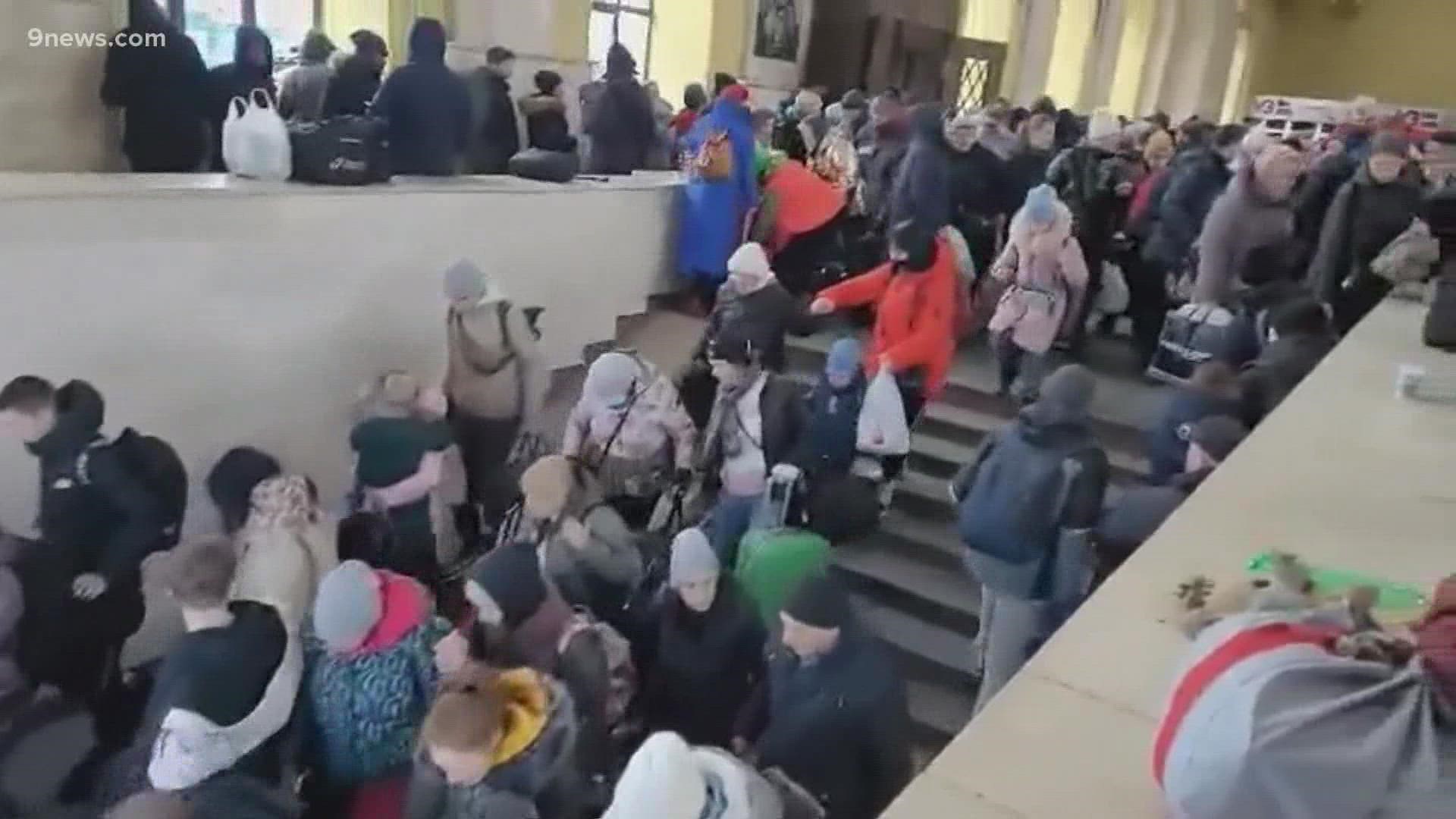COLORADO, USA — More than 2 million people have fled Ukraine since Russia invaded that country.
A UN official called it the fastest-growing refugee crisis in Europe since World War II.
In late February, Gov. Jared Polis told the federal government and the Ukrainian Embassy that Colorado pledges to welcome refugees.
The state said Colorado has resettled 270 Ukrainian refugees over the past decade, with 78 of those people arriving in the past two years. The state said many of those refugees fled the ongoing conflict in eastern Ukraine since 2014.
But resettlement experts say it's too early to know what to expect here in Colorado, and that any resettlement efforts for Ukrainian refugees will likely follow a different timeline than what happened with Afghan refugees in 2021.
Meg Sagaria-Barritt is the Integration Partnerships Coordinator at the Colorado Refugee Services Program, which is the state refugee office within the Department of Human Services.
9NEWS sat down with Sagaria-Barritt to discuss the resettlement process and what Colorado is expecting in the coming months and years.
(Editor’s note: This interview has been edited for context and clarity.)
9NEWS: What is the overall process for deciding where a refugee may go?
Sagaria-Barritt: I want to share what we talk about as the three durable solutions. They are the priorities for how we support refugees, protection-wise.
The first priority is repatriation. That’s essentially returning people safely to their home country. This is the first priority always, because people want to return home. They want to live safely in their home country.
The second priority we call local integration. This would be Ukrainians who would live long term, or permanently, in, say, Poland. That idea is that you’re in a neighboring country. You have access to legal permanent residency and/or citizenship. You’re allowed to work and build your life there.
Third priority is what we call third country resettlement. Third country resettlement is that movement to the U.S., Canada, Sweden, some of these other countries that participate in global refugee programs. That’s the least-used option. Less than 1% of refugees globally access third country resettlement.
The EU just extended protections to Ukrainians through a Temporary Protection Directive. What does that mean for refugees?
Sagaria-Barritt: It’s not supplanting the refugee process, but it's recognizing the fact that 2 million people have fled and so the mechanics of having 2 million or more people register with the UN as refugees is extremely difficult. So how do you provide a blanket form of protection for people in the near term so they are safe, so they can work, so kids can go to school and then probably look at a more conventional refugee process a little further down the line.
How long could it take before Colorado welcomes any refugees from Ukraine?
Sagaria-Barritt: Very early in a conflict or challenge, there is waiting. Intentional waiting, because you can’t figure out what option is best for people yet.
Just for context, we had seen this when Syrian war erupted. It was about two years before any Syrians made it to the U.S. from the start of the war until Syrians were actually resettled in the U.S., so quite some duration. That was waiting to find out what happened, and also the U.S. resettlement processing efforts to make sure it is safe, it is secure, and we’re providing slots to people who need them most.
The resettlement of refugees from Afghanistan happened much quicker --within months following evacuation. Could Ukraine follow a similar timeline?
Sagaria-Barritt: The evacuation of Afghans, in large scale, to the U.S., was not without precedent. There was some evacuation prior, like the fall of Saigon.
I can’t promise what process Ukrainians will come through, but there is a conventional process that we use, essentially, at all times prior to resettling this group of Afghans. The process and the means through which Afghans arrived was an anomaly. And I don’t have that crystal ball that says, "hey, we’ll use this again," or "nope, that was a one-time thing very specific to Afghans."
I think it’s very early and I think there will be different kinds of political pressure to support Ukrainians, and what that situation will look like and how it will involve the U.S. It's not really clear quite yet.
Why is Colorado a good place for refugee resettlement?
Sagaria-Barritt: I think Colorado is very welcoming. We have a big network of organizations, individual residents here, people who welcome folks with open arms. I think we do a good job with employment at more livable wages. I think we do a good job of building social capital – helping people build community – whether it be with residents here in Colorado or other members of their community. And I think keeping our eye on the long term, we want people to live full lives here too. That’s something we do well, and just proud that people from other countries come to call our state home.
SUGGESTED VIDEOS: Invasion of Ukraine

